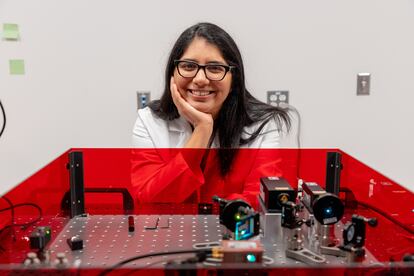A ferret daycare center to study how children catch the flu
The first results of an experiment with animals suggest that ventilation would stop infections less than hygiene

Everything was ready for Seema Lakdawala to open her small daycare center. She had found the perfect place and filled it with toys. It had food, stuffed animals, balls and even an air purifier. It also had a fairly large cage and a couple of cameras that would be recording the entire time. In spring 2022 it opened its doors in Pittsburgh, Pennsylvania, to welcome its first attendees: four healthy ferrets, and one with the flu.
Lakdawala is a virologist at Emory University (although this work was carried out at the University of Pittsburgh). Her goal is to study how the flu virus spreads through daycare centers, one of its most fertile habitats. “Ferrets have always been the standard for researching the flu virus,” she explains via videoconference, “because their respiratory system is very similar to ours.” Until now, however, the experiments used to take place in highly controlled environments. Pairs of the animals were put together in tiny cages for days. The problem is that this is not how they get infected in the wild, and it is certainly not how outbreaks develop among groups of preschoolers.
Lakdawala formed an interdisciplinary team with another virologist, two experts in aerosol transmission with experience in the study of real daycare centers, and a mathematician. Together, they attempted to replicate an environment that was comfortable for the ferrets (and quite familiar to anyone with small children). They gathered the animals for a few hours a day in this toy-filled common space. They gave them drinks and offered them snacks. Afterwards, each ferret went to rest in its cage separately.
Once they put the animals together, they realized that not only do ferrets have airways similar to ours, they also have similar behavior. “They are very sociable animals,” says the virologist. “They run and play. They bite toys, explore the space and have short, intense interactions with each other. I have small children and… well, the truth is that this reminds me of a lot of things they do,” she admits with a smile.
Over the course of a few months, Lakdawala and her colleagues watched several groups of ferrets play in the daycare while passing viruses to each other. The scientists meticulously recorded their movements. They marked the contaminated surfaces of the sick ones, paying attention to who touched them next. They took note of their fights and games. Which got sick and when. Their first findings, which they will publish in a few months in a scientific journal, offered some surprises.
“For instance, we wanted to see how the ventilation affected the contagion,” says the virologist. “We tried a normal air exchange, once an hour, similar to that in the daycare centers around here. Then, an exchange of 23 times per hour.” The result was the same: in both cases, 50% of the ferrets ended up being infected. What changed is when. “Those with reduced ventilation became ill quickly, within three days. Those who had more ventilation also became infected, but it took between three and seven days.” Thus, in this particular environment, increased ventilation may only serve to delay contagion.

Another time, a sick ferret was playing with four other healthy ones, but a fifth one stayed away. That one was the first to get sick. It seemed counterintuitive, but when they checked the cameras, the scientists saw how the sick ferret kept biting and licking objects and surfaces that the other one then also bit and licked, as if the first had left a trail of viral breadcrumbs for the second to pick up.
Ferrets tend to put their faces together, steal food, chew on toys and bite each other. This type of behavior is also quite common in a childcare center, but not in places like bars or offices. Therefore, the experiment makes sense for that context. There are many ways in which flu viruses can spread, and all of them occur in a daycare center, whether it is for ferrets or children.
Immune system under construction
“Saliva is one of the fundamental transmission routes in daycare centers,” confirms Margarita del Val, virologist at the Severo Ochoa Molecular Biology Center, in Spain, emphasizing that this is less relevant in adult environments. “That is why surface cleaning is important in this context.” In general, she recommends doing everything we learned with the Covid-19 pandemic, like ventilation, cleanliness and face masks, when children are old enough to wear them. “The coronavirus brought to the fore the route of transmission of all respiratory agents,” she points out. “And this applies to the flu, it applies to bronchiolitis and other respiratory transmitted viruses and bacteria.”
The pandemic comparison makes a lot of sense in this environment. “With Covid-19, we all faced a new virus for the first time in our lives. That is what happens to children every day in a daycare center: they are exposed for the first time in their lives to a virus, a bacteria or an infection that they have never fought against,” says Del Val, coordinator of the Platform for Global Health of the Spanish National Research Council.
According to a study by the Spanish Association of Primary Care Pediatrics, between 30% and 50% of all infections among the early childhood population can be connected to daycare centers, a figure that usually decreases after the first year. Pediatrician Pedro Gorrotxategi, vice president of this association, believes that infection “is inevitable, but that doesn’t mean we should give up, either.”
Most babies in daycare have eight to 15 colds a year; a few more than they would have if they were cared for alone, at home. However, after the first year, the number of respiratory diseases decreases. Furthermore, there are reasons to think that these first episodes may have a protective effect in the future.
In a study published in the journal Pediatrics, a team of researchers in the Netherlands followed a group of children during their first six years of life and observed the frequency with which they had acute gastroenteritis. Of the 2,220 children studied, 1,344 attended daycare during their first year of life. Those had more gastroenteritis at the beginning, but the others got sick more often as they grew up. At six years of age, the children in both groups had a similar average number of episodes of gastroenteritis. Gorrotxategi explains that these studies should not mislead parents: “There is this belief that it’s better to expose the child. That they will catch it sooner or later, anyway. But it’s not the same thing; it’s better to postpone it. Our immune system is more developed at four years of age than at two.”
Daycare viruses start brewing in offices. The working conditions of the parents have an impact on their children’s illnesses and under what circumstances they take them to daycare. Ideally, when children have the first symptoms of illness, they should stay at home. “But one thing is the health recommendation and another is real life,” acknowledges Gorrotxategi. “Many parents, when they are told that their child is getting sick, try to see if they can hold out until they leave work and can pick them up. The first year of kindergarten is complicated.” In this sense, measures such as working remotely can help. Vaccination, all the experts consulted agree, is another essential weapon. And above all, patience.
Sign up for our weekly newsletter to get more English-language news coverage from EL PAÍS USA Edition
Tu suscripción se está usando en otro dispositivo
¿Quieres añadir otro usuario a tu suscripción?
Si continúas leyendo en este dispositivo, no se podrá leer en el otro.
FlechaTu suscripción se está usando en otro dispositivo y solo puedes acceder a EL PAÍS desde un dispositivo a la vez.
Si quieres compartir tu cuenta, cambia tu suscripción a la modalidad Premium, así podrás añadir otro usuario. Cada uno accederá con su propia cuenta de email, lo que os permitirá personalizar vuestra experiencia en EL PAÍS.
¿Tienes una suscripción de empresa? Accede aquí para contratar más cuentas.
En el caso de no saber quién está usando tu cuenta, te recomendamos cambiar tu contraseña aquí.
Si decides continuar compartiendo tu cuenta, este mensaje se mostrará en tu dispositivo y en el de la otra persona que está usando tu cuenta de forma indefinida, afectando a tu experiencia de lectura. Puedes consultar aquí los términos y condiciones de la suscripción digital.









































